Related Research Articles

An Evening's Love, or The Mock Astrologer is a comedy in prose by John Dryden. It was first performed before Charles II and Queen Catherine by the King's Company at the Theatre Royal on Bridges Street, London, on Friday, 12 June 1668. Samuel Pepys saw the play on 20 June of that year, but didn't like it; in his Diary he called it "very smutty."
The Royalist is a 1682 comedy play by the English writer Thomas D'Urfey. It was staged at the Dorset Garden Theatre by the Duke's Company, shortly before the merger that created the United Company. It is set during the Commonwealth Era following the English Civil War.
The Banditti is a 1686 comedy play by the English writer Thomas D'Urfey. It is also known by the longer title The Banditti: or, a Lady's Distress.
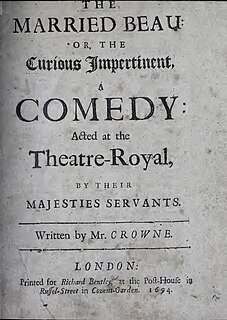
The Married Beau or The Curious Impertinent is a 1694 comedy play by the English writer John Crowne. It is inspired by a passage from Miguel de Cervantes's Don Quixote. Incidental music was composed by Henry Purcell.
The Adventures of Five Hours is a 1663 comedy play by the English writer Sir Samuel Tuke, 1st Baronet. Based on the play Los empenos de seis horas by Antonio Coello, It is an early example of the developing Restoration comedy tradition. Its success led to a series of sentimental plays in the Spanish style about love and honour, very different to the more sophisticated and cynical comedies which the Restoration era became known for.
The Country Wit is a 1676 comedy play by the English writer John Crowne, part of the tradition of Restoration Comedy. It was first staged at the Dorset Garden Theatre in London by the Duke's Company. The cast included Samuel Sandford as Sir Thomas Rash, Thomas Betterton as Ramble, James Nokes as Sir Mannerly Shallow, Henry Harris as Merry, Cave Underhill as Booby, Matthew Medbourne as Lord Drybone, Anthony Leigh as Rash, Mary Betterton as Lady Faddle, Mary Lee as Christina, Elizabeth Currer as Betty Frisque and Elinor Leigh as Isabella.

Dame Dobson is a 1683 comedy play by the English writer Edward Ravenscroft.
The Counterfeits is a 1678 comedy play by the English writer John Leanerd. It was staged by the Duke's Company at the Dorset Garden Theatre with a cast that included Anthony Leigh as Don Gomez, Thomas Gillow as Don Luis, Thomas Betterton as Vitelli, Henry Harris as Antonio, Matthew Medbourne as Carles, William Smith as Peralta, Thomas Percival as Dormilon, Cave Underhill as Fabio, Joseph Williams as Crispin, John Richards as Tonto, Mary Lee as Elvira, Emily Price as Violante and Anne Shadwell as Flora.
A Commonwealth of Women is a 1685 comedy play by the English writer Thomas D'Urfey. Originally performed by the United Company as the Theatre Royal, Drury Lane the cast included Joseph Williams as Captain Marine, Philip Griffin as Du Pier, Thomas Percival as Boldsprite, Thomas Jevon as Franvil, Anthony Leigh as Frugal, Joseph Haines as Hazard, Thomas Gillow as Don Sebastian, John Bowman as Nicusa, Henry Norris as La Mure, Joseph Harris as Bourcher, Katherine Corey as Roselia, Mary Lee as Clarinda, Margaret Osborne as Ariadne, Sarah Cooke as Aminta, Emily Price as Hippolita, and Frances Maria Knight as Aglaura.
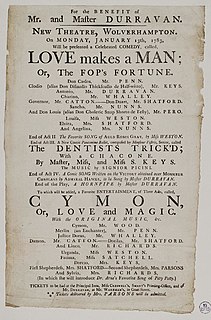
Love Makes A Man; Or, The Fop's Fortune' is a 1700 comedy play by the English writer Colley Cibber. It borrow elements from two Jacobean plays The Elder Brother and The Custom of the Country by John Fletcher.

She Would If She Could is a 1668 comedy play by the English writer George Etherege. It was originally staged at the Lincoln's Inn Fields Theatre by the Duke's Company.
The Woman Captain; Or, The Usurer Turned Soldier is a 1679 comedy by the English writer Thomas Shadwell. It was originally staged by the Duke's Company at Dorset Garden Theatre in London. The original cast is unknown except for Elizabeth Barry who played the title role, and also read the epilogue. It is part of the tradition of Restoration Comedy that flourished during the era.
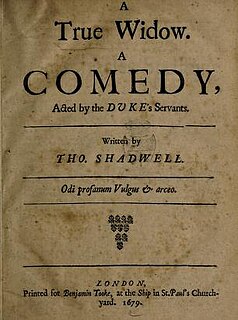
A True Widow is a 1678 comedy play by the English writer Thomas Shadwell. It was first staged by the Duke's Company at the Dorset Garden Theatre in London. The names of the original cast are unknown. The prologue was written by Shadwell's colleague John Dryden. It was published the following year and dedicated to Charles Sedley.
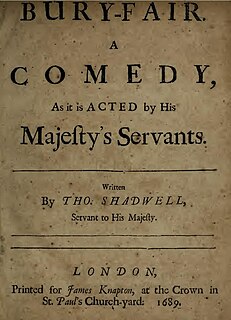
Bury Fair is a 1689 comedy play by the English writer Thomas Shadwell. It is part of the tradition of Restoration Comedy that flourished during the era. It was first staged by the United Company at the Theatre Royal, Drury Lane in London.
The Spanish Rogue is a 1673 comedy play by the English writer Thomas Duffet. It was first performed at the Theatre Royal, Drury Lane by the King's Company.

Love In The Dark; Or, The Man of Bus'ness is a 1675 comedy play by the English writer Francis Fane. It was first staged by the King's Company at the Theatre Royal, Drury Lane in London. The epilogue was written by the Earl of Rochester, and may also have contributed some of the more libertine lines to the play. It is set in Venice.
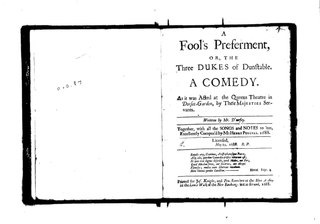
A Fool's Preferment; Or, The Three Dukes Of Dunstable is a 1688 comedy play by the English writer Thomas D'Urfey. It is a reworking of John Fletcher's Jacobean work The Noble Gentleman. It was first performed by the United Company at the Dorset Garden Theatre in London. Henry Purcell composed the play's incidental music. It was his first major work composingfor the theatre in seven years since Sir Barnaby Whigg.

Tunbridge Wells; Or, A Day's Courtship is a 1678 comedy play generally attributed to the English writer Thomas Rawlins. It was originally staged at the Dorset Garden Theatre in London by the Duke's Company. The names of the original actors are not known. It did not enjoy the same success as Rawlins' earlier work Tom Essence.

Sir Salomon; Or, The Cautious Coxcomb is a 1670 comedy play by the English writer John Caryll. It has often been staged under the title Sir Solomon Single. It was first performed by the Duke's Company at the Lincoln's Inn Fields Theatre in London. It is part of the tradition of Restoration comedy.
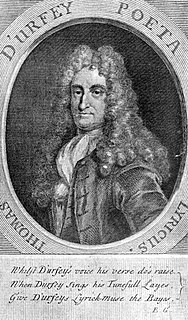
The Campaigners; Or, The Pleasant Adventures At Brussels is a 1698 comedy play by the English writer Thomas D'Urfey. It was first staged at the Theatre Royal, Drury Lane by Christopher Rich's Company.
References
- ↑ Van Lennep p.246